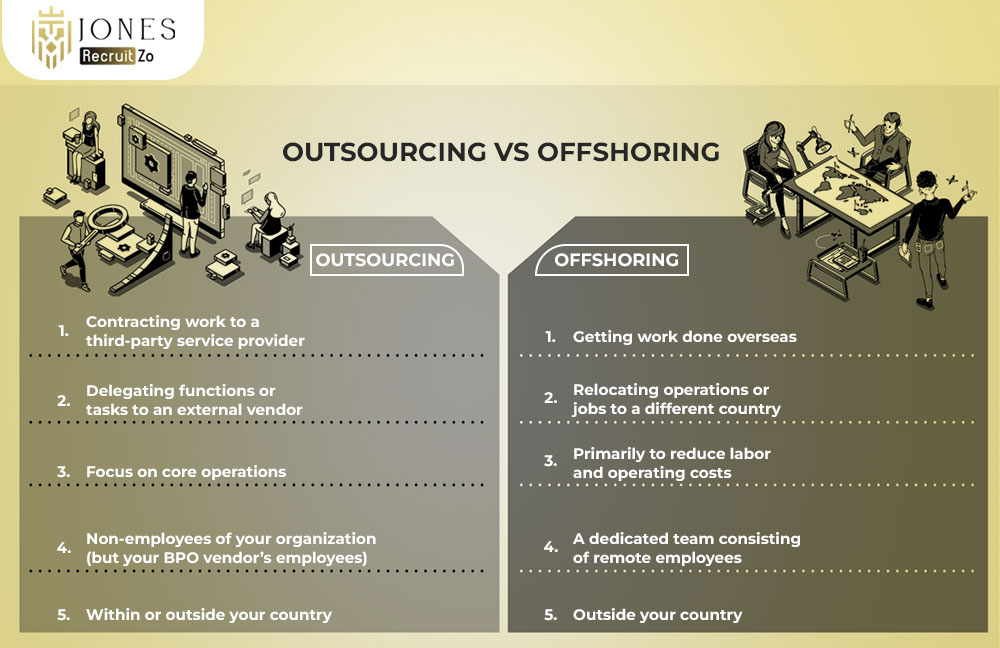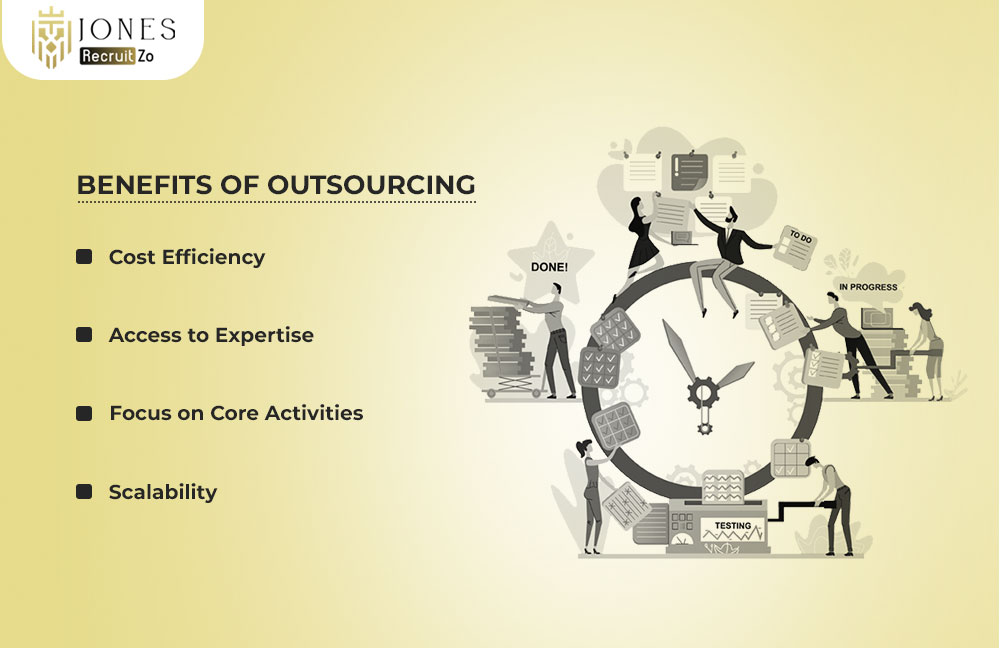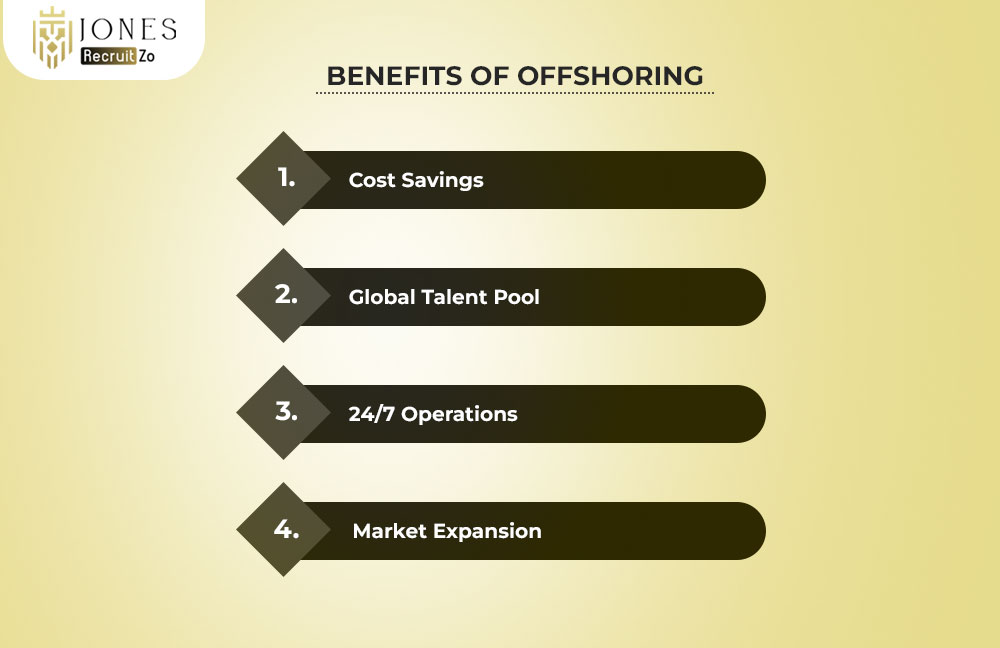Key Insights
Difference between outsourcing and offshoring
Outsourcing is the contracting of tasks considered secondary to an external vendor, and offshoring is relocating the business activities to overseas. Both are regarded as methods to reduce some operational costs and optimising efficiency but differ in terms of scale and implementation.
Outsourcing Meaning
Outsourcing comprises placing the performance or provision of specific services or tasks into the hands of an external provider who is specialised in such matters. This arrangement can enable companies to save time, maximise resources, and focus on more strategic objectives.
Offshoring Meaning
Offshoring entails relocating business operations (either through subsidiaries or third party partners) onto foreign soil. It aims at using cost advantages, skilled international talent, and global market opportunities.
Benefits of outsourcing and offshoring
These strategies offer cost advantages, specialised labour, and fast scaling. The selection of an approach should depend on whether the company needs flexibility from external vendors or the long-term benefits of an international presence.
What is Outsourcing?
Outsourcing is contracting third-party providers to perform specific services or tasks. It is generally utilised in things such as IT support, payroll, recruitment, marketing, and customer service.
Outsourcing is intended to relieve internal teams of burdensome jobs without compromising quality or efficiency. It opens up opportunities for organizations to tap expert skills wherever needed, thus eliminating the need to recruit, train, and retain permanent employees for every business function.
What is Offshoring?
Offshoring would then mean the moving of certain business activities to a foreign country in an effort to cut costs, tap into specialised talent, and find extended market opportunities. Many organisations opt for countries like India or the Philippines for the reason that they offer value for highly skilled workforce due to their lower labour costs.
Opposite to outsourcing are the avenues where offshoring means going by the setting up of a completely dedicated team abroad, as a subsidiary, or a joint venture with offshore partners. This view is long-term and strategic, considering one arm for cost savings and the other for global expansion.
Outsourcing Vs Offshoring

Although both terms are linked to efficiency and cost reduction, outsourcing and offshoring are different in execution. Below is a closer look at their key differences:
Meaning
Outsourcing implies sending assignments to an external company or vendor, which can be local or global. Offshoring, on the contrary, refers to shifting work into another country, at times involving more direct company participation.
Objectives
The main goal for outsourcing is to save time and resources by acquiring external help. Offshoring comes in with an intention to maximize the global pool of talent, minimizing cost of production, alongside entering international markets.
Meeting Possibilities
Usually, outsourcing involves vendors mostly working remotely, thus reducing the opportunity for hands-on meetings. Offshoring sets up foreign teams who may also work on an exclusive basis for a particular company, but with very few incentives for face-to-face meetings due to geographic distance.
Control
External vendors may have less restriction to execute the task in and with outsourcing, which lessens direct managerial control with the company. When offshoring, companies ensure better control as the offshore team acts as a true extension of the business.
Geographical aspect
Outsourcing can be local (within the same country) or international. Offshoring, by definition, always involves another country, making it a global expansion strategy.
Impact on employment
Outsourcing may reduce domestic job opportunities as tasks are handed to external providers. Offshoring generates employment in overseas markets, which can sometimes be seen as a loss for local talent but a gain for global workforce integration.
Benefits of Outsourcing

Outsourcing allows businesses to delegate non-core tasks to specialised providers, helping them save time and resources. It is a flexible approach that improves efficiency while giving companies access to expert services.
Cost Efficiency
Outsourcing reduces operational costs by maintaining parties outside the organization as opposed to hiring full-time employees in certain functions. Companies pay only for services they require, thus making it cheaper than hiring permanent staff.
Access to Expertise
External vendors bring specialised skills, tools, and methods that many companies cannot cultivate internally. This guarantees better quality and efficient execution of projects.
Focus on Core Activities
When non-essential functions are outsourced, a company is then capable of diverting more resources to innovation, business development, and customer satisfaction. This would enable governments and leadership teams to really start focusing on growth-driven matters.
Scalability
Outsourcing offers the possibility of scaling up or scaling down operations, depending on project requirements. This is businesses with seasonal demand or fluctuating workloads.
Benefits of Offshoring

Offshoring helps organisations reduce costs and tap into global talent by relocating operations to another country. It also enables continuous operations and supports long-term international growth.
Cost Savings
By transferring business activities into those countries with lower operating costs, the expenses are kept down, which includes saving labour charges, costs of infrastructure, and technology investments.
Global Talent Pool
Offshoring opens access to the best skills worldwide-from IT engineers to customer service representatives-to provide better output from different perspectives within a company.
24/7 Operations
Being active in different time zones, companies have the chance to work throughout the day. Projects get completed faster and uninterrupted customer support gets delivered.
Market Expansion
Being active in different time zones, companies have the chance to work throughout the day. Projects get completed faster and uninterrupted customer support gets delivered.
Examples of Offshoring and Outsourcing
Offshoring Example
A US-based software company sets up a development centre in India to handle coding and testing, reducing costs while accessing skilled IT professionals.
Outsourcing Example
A retail company hires an external payroll service provider to manage employee salaries and compliance, allowing the HR team to focus on core activities.
FAQs
1) What is Outsourcing?
Outsourcing is when a third party is enlisted to do something else for a company: anything that is not deemed core to the company anymore. Outsourcing leads to cost reduction, more efficiency, and the ability to tap into expert knowledge.
2) What is the difference between outsourcing and offshoring?
Outsourcing means giving a task to an external vendor, while offshoring means moving business operations to another country. Some companies do both for maximum efficiency.
3) What is Offshoring?
Offshoring entails moving certain business operations to another country to cut costs and hire international talent. It can be done by setting up a subsidiary or by engaging with offshore providers.
4) What are the benefits of outsourcing?
The most widely recognized benefits are cost savings, access to specific expertise, being able to concentrate on core activities, and the ability to scale up or down Flexibility is given while Responding to high-quality demands.
5) What are the benefits of offshoring?
Offshoring helps to cut costs, offers access to talented resources worldwide, runs around the clock time-wise, and expands international market presence. In pursuing long-term growth, avenues can be provided for the competency of choice.















